Two Northern California members of Congress are asking the Federal Emergency Management Agency to clarify under what conditions it will reimburse the state for the cost of rebuilding and rehabilitating the ruined spillways at Oroville Dam.
The request came from Reps. Doug LaMalfa, R-Richvale, and John Garamendi, D-Fairfield, who represent Sacramento Valley districts directly impacted by last year's Oroville spillway crisis.
The congressmen asked in a letter sent last week whether FEMA might refuse payment for reconstruction work in light of an independent forensic team's finding that Oroville's main spillway failed because of poor design and construction and a history of ineffective inspections and maintenance. The two House members also want to know whether agency policy will bar funding upgrades to the damaged facilities.
The reconstruction project involves total replacement of the main spillway, a 3,000-foot-by-180-foot concrete chute, and extensive reinforcement of an adjacent hillside meant to serve as an emergency spillway to channel overflow from the Lake Oroville reservoir.
The main spillway failed catastrophically a year ago and the subsequent overflow down the hillside triggered severe erosion. The erosion led in turn to fears of an uncontrolled release from the reservoir and prompted the emergency evacuation of 188,000 downstream residents.
